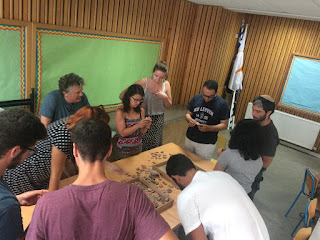Another summer has come and gone. How did you spend your summer? Conducting fieldwork with very limited internet connections? Or preparing endless samples in the laboratory? Or writing your 10th grant proposals of the year? Some fellow archaeologists spent their summer attending an Archaeological Science Summer School in Cyprus. The summer school was organised by The Science and Technology in Archaeology and Culture Research Centre (STARC) of the Cyprus Institute, in collaboration with the Cypriot American Archaeological Research Institute (CAARI). The summer school was held between the 21st and 27th July, based at the excavation of the site of Kissonerga Skalia in the Paphos region. The theme of this year's summer school was 'From Natural Resources to Material Culture: Transdiciplinary Approaches in Archaeological Science'. Cosima Carnegie, who was one of the participants, had given us her testimony of the summer school.
Here is Cosima's testimony:

The application of scientific analyses in archaeological research has become increasingly popular and common over the past two decades and will continue to do so at an immensely rapid rate. The Archaeological Science Summer School provides a comprehensive overview of different topics in archaeological science.
What did I expect before I attended the course?
I hoped that by attending this course it would help me connect with like-minded academics from other disciplines and other parts of the world. I have participated in fieldworks in several countries, but I felt that I was lacking adequate knowledge regarding the principles, theories and applicability of different scientific analyses, and what questions archaeological science can help to answer. I hoped that this course would fill in the gaps in my knowledge and enrich my experience in relevant field.
What did I learn from the course?
I have not only gained a significant amount of information about archaeological science, but I also learnt the importance of inter-disciplinary collaboration in order to take research to the next level. I also have been made aware of the importance of collaboration and sharing archaeological data, which are crucial to the long-term development of Mediterranean archaeology, as well as archaeology elsewhere.
What did my peers and I do during the course?
Many different guest lecturers gave talks on their areas of specialization. Professor Matthew Collins gave an engaging talk on proteins, which was very intelligible despite my lacking a science background. Dr Giulio Lucarini and his student Diego spoke about lithics and ethnoarchaeology. Professor Vasiliki Kassianidou taught the class about the significance of pyrotechnology and copper production in Cyprus. Professor Thilo Rehren furthered on this topic, lecturing on early copper production and describing his non-traditional career path and the way in which his archaeological work is enriched by his background in earth sciences. Professor Cyprian Broodbank gave an encapsulating and enthralling talk on the Mediterranean narrative and the global significance of the Levantine connective zone throughout history. Osteoarchaeology was discussed byDr Efthymia Nikitawho explained, “some bones are more talkative than others.” Dr Evi Margiritis delved into archaeobotanical research and Dr Anna Spyrou covered zooarchaeology, painting an adorable picture of dwarf hippos and elephants.
Archaeological excavation is a complicated puzzle with a thousand pieces. The Archaeological Science Summer School provided excellent information that helped me fill out more of this puzzle. Regardless of your speciality this course will deepen your understanding of the field as a whole. I learnt a great deal about the surprising and fascinating ways in which archaeological science operates and the light it can shed on archaeology and history. This course especially emphasised the responsibility borne by archaeologists to increase the communication between experts of different backgrounds and the importance of encouraging and facilitating collaboration within the field.
In case you would like to find out more about the summer school, visit their official webpage: https://promisedtwinning.cyi.ac.cy/training/summer-school.
Don't worry if you miss out on the opportunity to spend a week on the beautiful island of Cyprus because this year's summer school was the first of the series, which are part of the initiatives of the Horizon 2020 project 'PROMISED: Promoting Archaeological Science in the Eastern Mediterranean'. You can learn more about this cool project by visiting their webpage: https://promisedtwinning.cyi.ac.cy.


Comments
Post a Comment